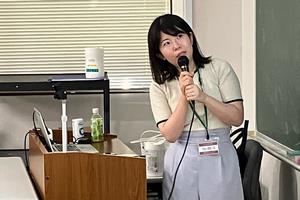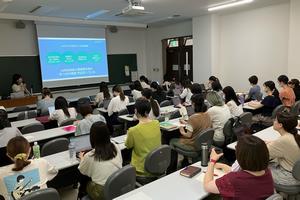- Global Collaboration Center
- Activity
- Report on the 31th SDGs (Sustainable Development Goals) Seminar “A Safe and Secure Base of Children’s Minds and the People Who Work There” (June 2023)
ページの本文です。
Report on the 31th SDGs (Sustainable Development Goals) Seminar “A Safe and Secure Base of Children’s Minds and the People Who Work There” (June 2023)
2024年7月1日更新
On Monday, June 19, Ms. Yuki Sasama from Katariba, an authorized NPO, gave a lecture. During the lecture, she not only presented the vision of Katariba and provided an overview of its after-school support facilities but also shared her journey to join Katariba and her feelings about her role.
In the first part of her lecture, Ms. Sasama presented the reasons behind Katariba’s activities. I was particularly impressed by the phrase “a society that nurtures the ability to create the future, no matter what kind of environment you were born and raised in.” Katariba’s organizational strength lies in its “naname-no-kanbkei” (a diagonal relationship that respects children’s individuality) relationship model. This term refers to a relationship in which children interact with neither a superior entity, such as a teacher or guardian, nor someone too close, like a friend. This allows adults to play an appropriate role for the child depending on the situation. Ms. Sasama noted that children face an "opportunity gap" in developing their motivation and creativity, influenced by factors such as whether they have experienced family trips and lessons, whether they are surrounded by peers of the same age, and whether they grew up in a family environment where their ideas are respected. She emphasized that, in order to narrow this gap and achieve Katariba’s vision, society needs to take action rather than leaving it solely to mandatory education or families.
After listening to the first part of the presentation, I had a strong impression that Katariba respects children's autonomy, in contrast to existing “learning support” or “creating a place to belong” programs. Their approach emphasizes creating opportunities for children to be motivated and creative on their own, rather than merely supporting their learning or passively listening to them. This aligns with their description of building a "naname-no-kankei" with children, as opposed to a hierarchical or lateral relationship that can interfere with their development. I also found the concept of building a "naname" relationship with children to be significant, and I am eager to see for myself how this concept is actually realized.
During the talk about Katariba’s after-school support facility, I learned not only the facility and its activities, but also Ms. Sasama’s experiences there. The facility provides meals to keep the children healthy and supports them in a variety of ways, including group and individual learning support. I realized that this facility plays a different role than a school or cram school, where children follow a set schedule of activities, but here a different approach is taken. Recently, they distributed meals and provided each household with hardware for online learning to ensure that children are not left without support during the spread of COVID-19. Katariba’s response to the pandemic has been astounding; few NPOs have been able to respond so flexibly in the face of the COVID-19 expansion. Ms. Sasama noted that one of Katariba’s strengths is its ability to immediately incorporate staff ideas into its operations, and I believe that organizational speed and flexibility are essential for providing effective support.
In the second part of the lecture, I learned that her career changed from an office job to Katariba. Ms. Sasama mentioned that she valued the work environment when choosing her career. After living in places outside of Tokyo, she realized that she wanted to return to the city. She also shared that she continues to discover the best ways to interact with her children through trial and error, acknowledging that the right answers are not always immediately apparent.
It was very interesting to hear the experiences of people who are active in NPOs, and it was a valuable experience for me.
(Asuka Sakakihara, sophomore student, Department of Liberal Arts and Humanities, Faculty of Letters and Education)












